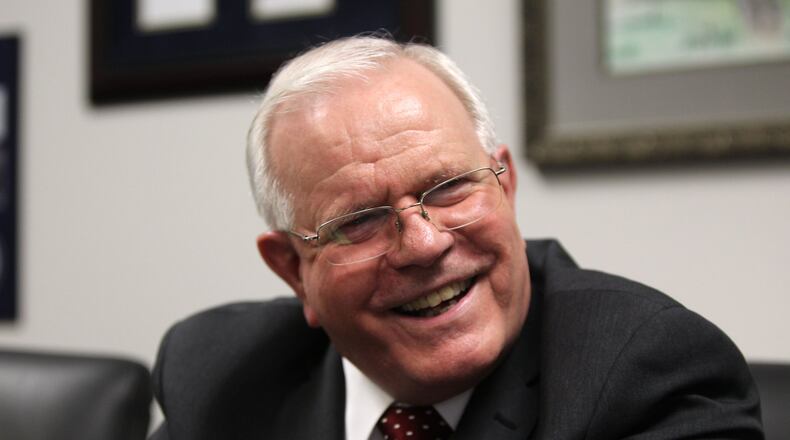Gwinnett County’s school system has four employees who share a personal bond with its superintendent, J. Alvin Wilbanks, that some say is troubling.
Two are his children. Two are grandchildren.
Wilbanks said there’s no conflict-of-interest with those relatives working for Gwinnett, the state’s largest school district with about 23,000 employees. In an interview, the veteran superintendent said he played no role in their hirings, has no oversight over their job performance and they do not receive special treatment or job protection from him or anyone in Gwinnett.
“We’re a big employer. It’s a great school district … I don’t have a problem with it,” said Wilbanks, who became Gwinnett’s superintendent in 1996.
None of the other superintendents in metro Atlanta’s largest school districts have any immediate relatives on the payroll, according to officials in those districts. Wilbanks told the AJC he had four relatives on the school district’s payroll and provided their personnel files at no cost to the newspaper.
The Gwinnett situation is legal, but some say it creates ethical concerns, particularly for the relatives’ supervisors.
“If you are supervising someone who is related to your supervisor, it causes you to handle that person differently,” said Sabrina Smith, who’s done some management consulting work and has fought the school system in court over some past actions. “It’s not a healthy work environment.”
One daughter, Tricia Wilbanks Giles, is a teacher and was first hired by Gwinnett in 2006. Another daughter, Tonya Robinett, is a human resources coordinator hired in 2011. His grandson, John Robinett, is a technology support technician at a middle school and was hired in March 2016. Another granddaughter, Brittany Robinett, is an assistant human resources director.
The Atlanta Journal-Constitution received a tip that the most recent hire, Brittany Robinett, a granddaughter who joined the school district in July, may not be the best-qualified person for the job.
Robinett, is the assistant director of Title IX Equity & Compliance. The job assists in handling internal age, disability, gender and racial discrimination complaints. She was hired in July.
Brittany Robinett was one of about three dozen candidates who applied for the job and four who were interviewed for the position. She got her law degree from Georgia State in 2015, and her last job was as a research assistant at Holzer & Holzer LLC, a Dunwoody-based law firm that specializes in securities fraud and corporate misconduct. Robinett got the job over other finalists that included a school district human resources employee with more 15 years on the job and another candidate who worked more than seven years as Morehouse College’s Title IX ethics and compliance officer.
The former Morehouse employee, Doris Coleman, said she felt confident about her prospects to be hired after her interview. She called the school district and learned she didn’t get the job, but was unaware it was Robinett who was hired.
“You cannot have a compliance system and (Wilbanks) not be involved in it,” said Coleman, who now runs her own human resources consulting company. “I find it very interesting (she was hired).”
Robinett wrote on her application she learned about the job through Indeed, a jobs website. Wilbanks said the selection process was handled by the Human Resources department. She had the job application’s preferred legal degree and state certification qualifications, but not the preferred five years’ experience in employee or human relations.
Gwinnett HR officials stressed these were preferred qualifications.
“Based on the totality of the hiring process — the application, a review of candidates’ experience and skills and interview — the candidate selected was the best candidate for the job,” they said via email.
Marlyn Tillman, a frequent critic of Gwinnett’s policies, particularly regarding school discipline, said she’s deeply disturbed by these decisions.
“I don’t particularly like it,” she said. “It raises questions. Is it about your qualifications or is it about who you are connected to?”
Gwinnett, like other Georgia school districts, has a nepotism policy that prohibits an employee from directly supervising a related employee. Otherwise, it cautions workers to avoid conflicts of interests or appearances of conflicts.
Wilbanks maintains he has no involvement over the job duties of his relatives on the school district’s payroll.
Gwinnett doesn’t ask prospective employees if they’re related to anyone working in the school district. Some similarly sized school districts across the nation, such as Dallas, Texas, ask if they’re related to a current employee. Some do not.
Kelly Coash-Johnson, executive director of the Kansas-based American Association of School Personnel Administrators, said it’s unlikely Wilbanks would have any involvement in the hirings of those relatives, saying those decisions would be made at the department director level. She also said a district the size of Gwinnett likely has computer software that vets job candidates before they reach a department director’s desk.
“I would have zero concerns” of nepotism violations, Coash-Johnson said.
Harvey Newman, a Georgia State emeritus professor of public policy said what Wilbanks is doing may be legal, but not ethical.
“That’s going to impact any evaluation and treatment” of the employees, Newman said. “It’s not a good way to run an organization.”
About the Author




